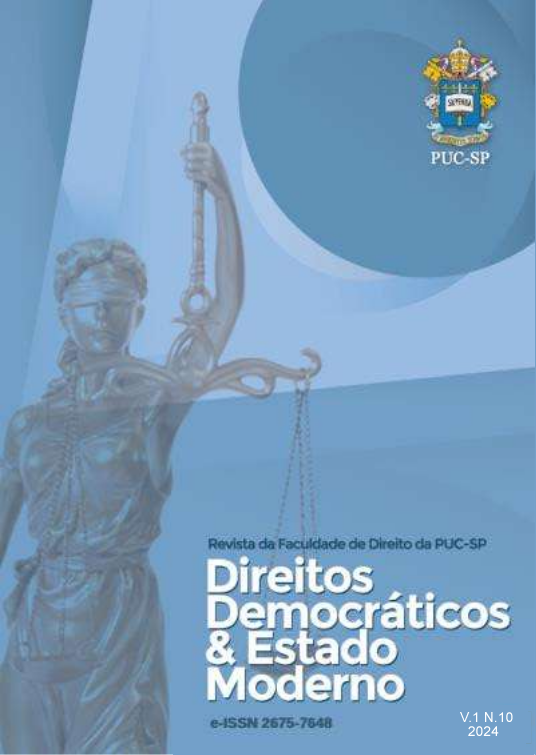Teleworking in the COVID-19 pandemic:
The experience of Goiás Court of Justice servants
DOI:
https://doi.org/10.23925/ddem.v.1.n.10.63666Keywords:
Teleworking, Pandemic, COVID-19, Servers, Court of justiceAbstract
Teleworking, previously seen as a possibility that was barely applicable to Brazilian courts, given the rigidity of the organizational culture of public administration, became a latent reality in a short space of time, with the advent of the COVID-19 pandemic. This research intended to analyze the experience lived by employees of the Court of Justice of Goiás (TJGO), after adopting distance work. To this end, a quantitative and qualitative analysis of the data collected was carried out, based on the application of a virtual questionnaire covering themes directly linked to the subject, through the Electronic System of the Citizen Information Service (e-SIC) in which it was answered anonymously by 15 court employees, in addition to bibliographical research on the topic. The results obtained were compiled via an Excel spreadsheet and after a systematic review, it was clear that in the participants' perception, this change brought both positive and negative impacts. If, on the one hand, the employees pointed out an improvement in their quality of life due to the fact that they did not need to travel to the workplace and avoid the daily wear and tear of traffic, on the other hand, some expressed difficulties in being able to separate the professional from the personal, in addition to the lack of defined schedules, causing overload in the working day. However, despite the setbacks and lessons learned on this journey, employees understand that remote work is 100% applicable to the court.
References
ANTUNES, Evelise Dias. Teletrabalho: o novo lócus de trabalho pós-pandêmico? uma perspectiva transnacional da política e o caso da implementação na Justiça Federal Brasileira antes e durante a pandemia de covid-19. Tese de Doutorado em Saúde Pública - São Paulo: Faculdade de Saúde Pública, Universidade de São Paulo, 2022. Disponível em: doi:10.11606/T.6.2022.tde-20092022-164350. Acesso em 16/10/2023.
ANTUNES, Evelise Dias. FISCHER, Frida Marina. A justiça não pode parar?! Os impactos da COVID-19 na trajetória da política de teletrabalho do Judiciário Federal – Revista Brasileira de Saúde Ocupacional (2020). Disponível em: https://doi.org/10.1590/2317-6369000025920. Acesso em 16/10/2023.
CARVALHO, Augusto César Leite de. BLIACHERIENE, Ana Carla. ARAÚJO, Luciano Vieria. Quando Um Vírus Nos Desafia: Pandemia, Novas Tecnologias E Teletrabalho – Desafios Do Século XXI. Revista Controle - Doutrina e Artigos 18.2 (2020): 21-41. Disponível em: https://doi.org/10.32586/rcda.v18i2.640. Acesso em 16/10/2023.
CONSELHO NACIONAL DE JUSTIÇA (BR). Resolução nº 185, de 18 de dezembro de 2013. Institui o Sistema Processo Judicial Eletrônico - PJe como sistema de processamento de informações e prática de atos processuais e estabelece os parâmetros para sua implementação e funcionamento. Brasília, DF: CNJ; 2013. Disponível em: https://atos.cnj.jus.br/atos/detalhar/1933. Acesso em 16/10/2023.
GUERRA, Maria Helena Tavares da Silva. SILVA NETO, Rodopiano Rocha da. RANIERI, Tais Ribeiro. GOMES, Úrsula Custódio. Teletrabalho Estruturado Na Administração Pública. Revista De Administração, Sociedade e Inovação 6.3 (2020): 98-116. Disponível em: https://www.rasi.vr.uff.br/index.php/rasi/article/view/465/127. Acesso em 16/10/2023.
RODRIGUES, Ana Cristina Barcellos. Teletrabalho: a tecnologia transformando as relações de trabalho. São Paulo: Faculdade de Direito, Universidade de São Paulo, 2011. Dissertação de Mestrado em Direito do Trabalho. Disponível em: doi:10.11606/D.2.2011.tde-14062012-112439’. Acesso em 16/10/2023.
Downloads
Published
How to Cite
Issue
Section
License
Copyright (c) 2024 Democratic Rights & Modern State

This work is licensed under a Creative Commons Attribution 4.0 International License.
This work is licensed under a License Creative Commons Atribuição 4.0 Internacional.
The authors grant the journal all copyrights relating to the published works. The concepts issued in signed articles are the absolute and exclusive responsibility of their authors.
DD&EM Magazine - ISSN 2675-7648

















